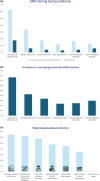Autonomic nervous system education in Europe: EAN/EFAS/INUS survey on curricula and skills in autonomic medicine of European neurology residents and consultants
- PMID: 39387467
- PMCID: PMC11555144
- DOI: 10.1111/ene.16515
Autonomic nervous system education in Europe: EAN/EFAS/INUS survey on curricula and skills in autonomic medicine of European neurology residents and consultants
Abstract
Background and purpose: Centers for training in autonomic nervous system (ANS) disorders are not widely available and the recent coronavirus 2019 pandemic temporarily reduced training opportunities in autonomic medicine across European countries. Here we evaluated the current state of education, clinical skills and postgraduate educational preferences on ANS disorders of European neurology residents and consultants.
Methods: A 23-item questionnaire was developed and distributed online amongst European neurology residents and consultants via mailing lists of the European Academy of Neurology. The questions assessed demographics, current training opportunities and learning preferences in ANS disorders. Six multiple-choice questions were used to self-evaluate knowledge of ANS disorders.
Results: In all, 285 individuals answered the survey (60% female, mostly 25-34 years of age). All respondents considered clinical autonomic skills necessary for good clinical neurological practice, and 92% would like to increase their ANS knowledge. Female respondents and those who trained in Southern/Eastern/Greater Europe more frequently judged ANS skills important for clinical practice than male respondents (p = 0.012) and respondents from Northern/Western Europe (p = 0.011). Female and younger respondents felt less confident in managing ANS disorders (p = 0.001 and p < 0.001, respectively). Respondents below 45 years of age (p < 0.001) and those with lower confidence in managing ANS disorders (p = 0.004) were more likely to recommend that ANS education is embedded in the residency curriculum.
Conclusions: Most European neurology residents and consultants reported a need for more autonomic education, with additional gender, age and regional differences. These findings underscore the importance of increasing the educational content on autonomic medicine in European medical and postgraduate curricula.
Keywords: autonomic nervous system disorders; clinical neurology; medical education; residency program.
© 2024 The Author(s). European Journal of Neurology published by John Wiley & Sons Ltd on behalf of European Academy of Neurology.
Conflict of interest statement
Diogo Reis‐Carneiro: reports speaker fees from BIAL and Zambon. Magdalena Krbot Skoric: participated as a clinical investigator and/or received speaker fees from Sanofi Genzyme, Merck, Novartis, Roche. Mario Habek: received speaker/consultation fees from Astra Zeneca, Biogen, CNSystems, Merck, Novartis, Roche, Sandoz and Zentiva. Received funding from the Croatian Science Foundation. Ivan Adamec: participated as a clinical investigator and/or received speaker/consultation fees from Actelion, Alexion Pharmaceuticals, Alvogen, Bayer, Biogen, Merck, Novartis, Pliva/Teva, Roche, Sanofi Genzyme, Sandoz and TGI Pharmaceuticals. Giovanna Calandra‐Buonaura: received speaker fees from Abbvie. Pietro Cortelli: reports no disclosures. J. Gert van Dijk: is a scientific consultant for Finapres since 2023. Cristian Falup Pecurariu: reports editor fees from Springer and Elsevier; speaker fees from Abbvie, Zentiva and from the International Parkinson and Movement Disorder Society (MDS), outside of the present work. Pietro Guaraldi: reports no disclosures. Max J. Hilz: reports no disclosures. Valeria Iodice: participated as a clinical investigator and/or received consultancy fees from Theravance, Takeda, Astra Zeneca outside the submitted work. Jens Jordan: reports no disclosures. Isabel Rocha: reports no disclosures. Walter Struhal: reports no disclosures. Astrid Juhl Terkelsen: reports consultancy fees for Alnylam Sweden AS, Novo Nordisk, Y‐mAbs Therapeutics A/S and AstraZeneca. Roland Thijs: reports lecture and consultancy fees from Medtronic, UCB, Angelini Pharma, Theravarance, Zogenix, Novartis, LivAssured and Arvelle, and grants from Medtronic and NewLife Wearables, outside the submitted work. Beatriz Tijero: reports no disclosures. Thomas Berger: reports no disclosures. Irena Rektorova: reports no disclosures. Elena Moro: reports no disclosures. Anne Pavy‐Le Traon: reports no disclosures. Gregor Wenning: author deceased. Jalesh N. Panicker: is supported in part by funding from the United Kingdom's Department of Health NIHR University College London Hospitals Biomedical Research Centres funding scheme and reports consultant fees (Idorsia, Coloplast, Medice), speaker honorarium (Coloplast, Wellspect) and royalties (Cambridge University Press). Alessandra Fanciulli: reports royalties from Springer Verlag, speaker fees and honoraria from Theravance Biopharma, Bial, CNSystems, Broadview Ventures, Antag Therapeutics, KABEG, Austrian Autonomic Society, Elsevier, International Parkinson Disease and Movement Disorders Society, Austrian Neurology Society, Austrian Autonomic Society and research grants from the FWF‐Austrian Science Fund, Medical University of Innsbruck, US MSA Coalition, Dr. Johannes and Hertha Tuba Foundation, outside of the present work.
Figures


References
-
- Williams S, Raheim SA, Khan MI, et al. Cardiac autonomic neuropathy in type 1 and 2 diabetes: epidemiology, pathophysiology, and management. Clin Ther. 2022;44(10):1394‐1416. - PubMed
-
- (UEMS) EUoMS . European training requirements for neurology. Accessed at https://www.ean.org/fileadmin/user_upload/ean/ean/learn/Career_developme... 2021.
MeSH terms
LinkOut - more resources
Full Text Sources

